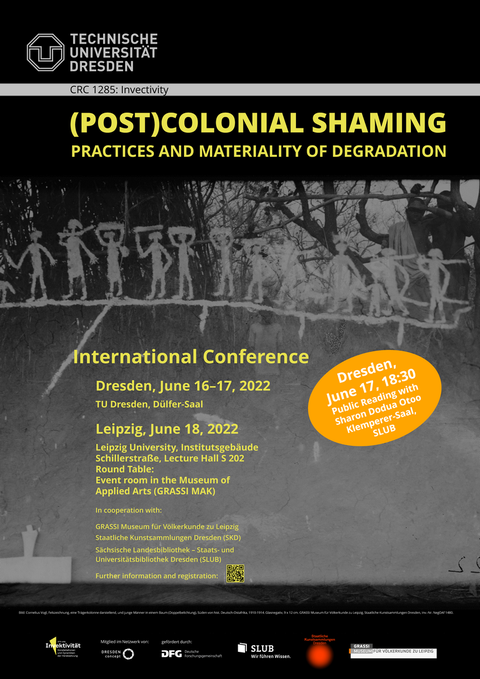Description
Emotion-based practices such as shaming, humiliation, and discrimination are important for the establishment and consolidation of colonial power structures.
The ensuing positioning, belonging, and asymmetrical coding effects within colonial contexts were not the products of human actors alone, however. Physical objects were also constitutive of European colonialism’s disparagement practices in the late 19th and 20th centuries.
The materiality of these things for use in daily life was transformed, that is, it was imbued with new meaning or affected in diverse other ways. Weapons and traded colonial wares, for example, became vehicles for emotionally charged political strategies. Ritual and art objects manifested fundamentally traditional or newly configured power hierarchies, as did the buildings and infrastructure of a given place or space.
Images and texts also played their parts in colonial disparagement practices, doing so in specific material forms, including as photographic postcards. Even today, objects with a colonial connection can perpetuate and repeatedly invoke shame, for example, when used in educational and commemorative contexts, as the current restitution debate on the Benin bronzes makes clear.
The removal of everyday objects from their original cultural contexts for display in European colonial exhibitions lent the exhibits a signifying valence. It allowed European audiences to construct their own cultural superiority. The depiction of people and items from colonial territories in European visual and textual media likewise assigned colonial roles to the colonized.
Meanings were inscribed on things that had a significance in the production and consolidation of colonial domination.
Thus, photography in colonial contexts was crucial to forming the Western conception of the “primitive” or the colonial “exotic.” Finally, transfer processes and changes in meaning continue to characterize the postcolonial lives of items, people, power, and knowledge still marked by colonialism.
That said, historical and cultural shifts in encodings do not erase what preceded them. Instead, the old and the new overlap as they continue to shape the colonial or postcolonial lives of things. This circumstance gives rise to a variety of problems related to colonial objects and references. From today’s perspective, we must discuss if and how to treat objects and practices that are already deeply interwoven with disdainful colonial appropriation.
This conference of CRC 1285 Invectivity: Constel-lations and Dynamics of Disparagement at TU Dresden seeks to strengthen our understanding of how disparagement and humiliation – as constituent elements of material colonial practices – helped fashion colonial politics of shaming and persisted in the cultural memories of the post-colonial present:
1. In analytical terms, the conference examines the emotional practices of belittling and their materialities with the concept of “invectivity.” Subsuming diverse manifestations of vituperation, shaming, and disparagement, invectivity acts as a communication form that transcends epochs and cultures. We are interested in the historical dynamics of colonial recoding as well as in the delocalizations of colonial “found objects.” This includes altered attributions of meaning and the reappropriation of objects, say “looted art,” into the postcolonial present.
Using interdisciplinary approaches, the connection between material objects from colonial contexts and their functioning as media of invectives – still operative today – will be brought into focus.
2. The problem at hand will be discussed from the perspectives of cultural studies, history, and museum studies. The emphasis is on the possibilities and limits of critical analysis of colonial practices with a view to the ethically appropriate treatment of colonial “acquisitions” instead of their ongoing degradation.
At the same time, we explore the possibilities and practical consequences of the realization of a “shared heritage” approach. This issue ties in with current debates on discrimination and memory culture, debates on how societies can appropriately deal with the violence-accompanied invectivity of the past without reproducing the latter’s associated ignorance, repression, and ongoing colonial othering.
The conference is a cooperation between the Collaborative Research Center 1285 „Invectivity. Constellations and Dynamics of Disparagement“, the GRASSI Museum für Völkerkunde zu Leipzig (Leipzig Museum of Ethnology), and the Saxon State Library - Dresden State and University Library (SLUB).
We hope the conference will make a substantial contribution to these internationally pressing questions, especially since it is interweaving with the reopening of the GRASSI, which took place in March 2022.

